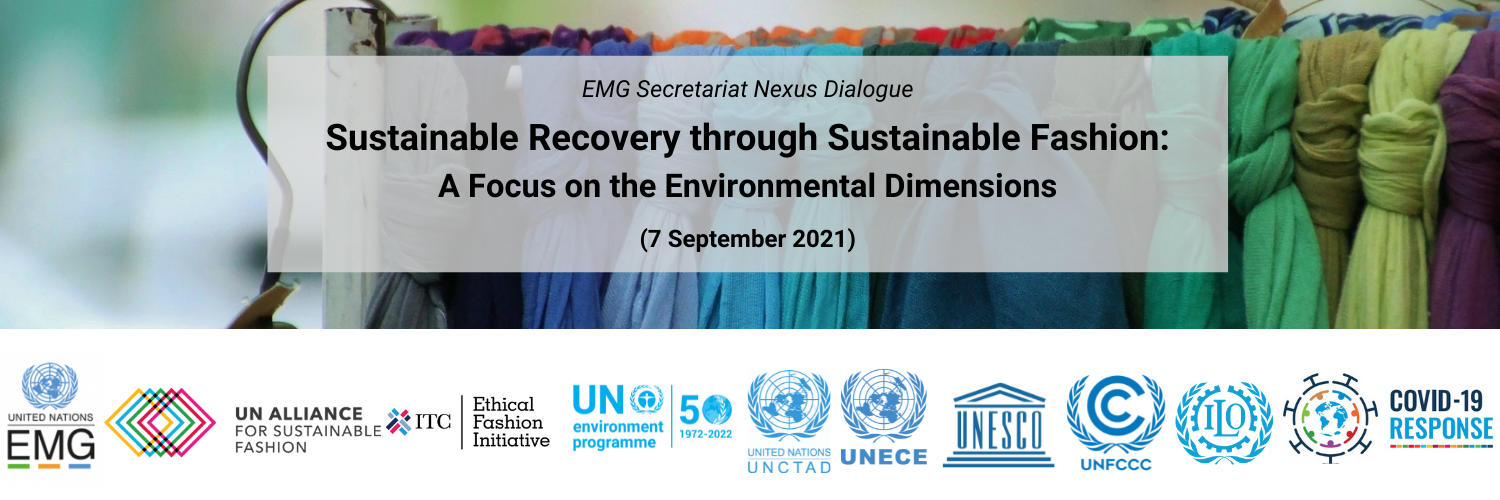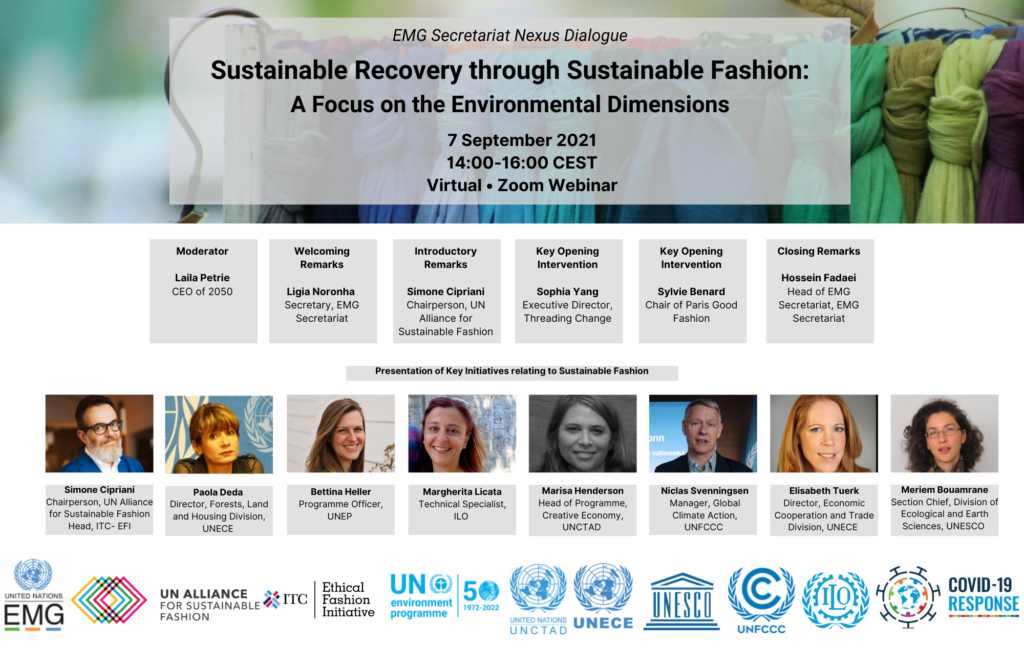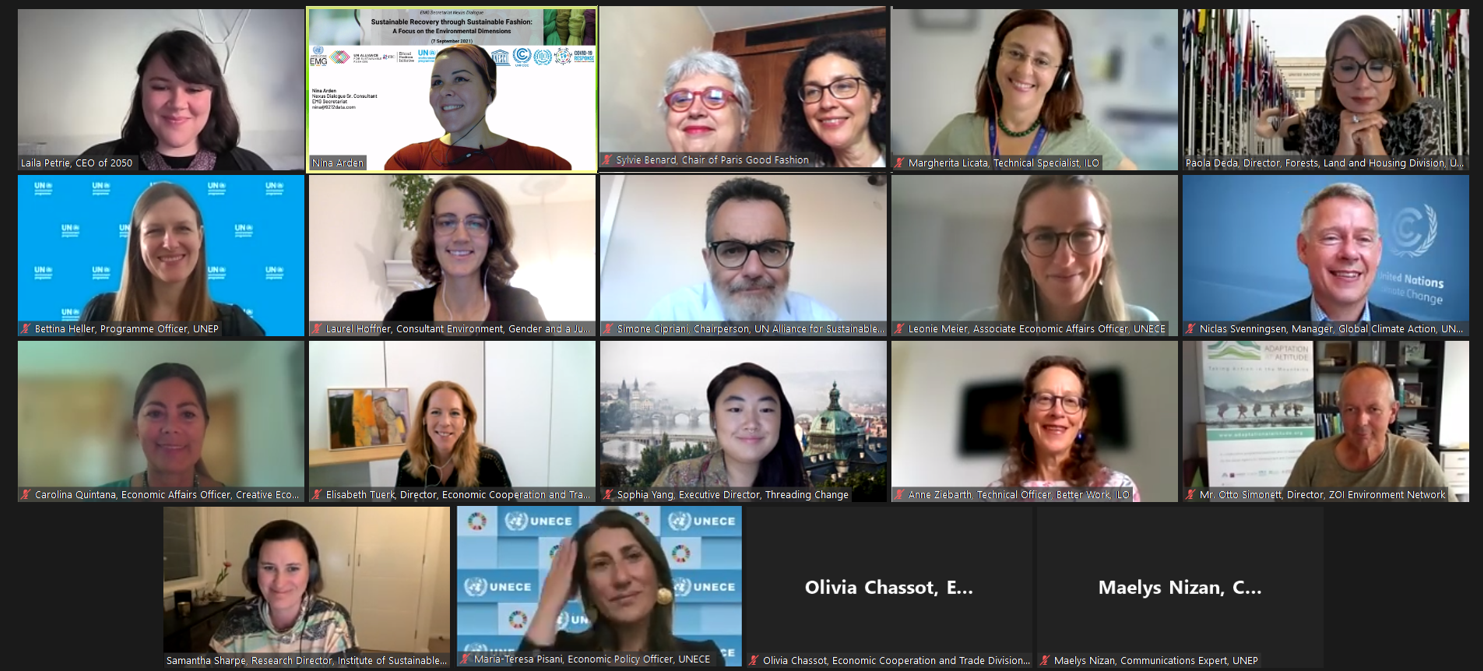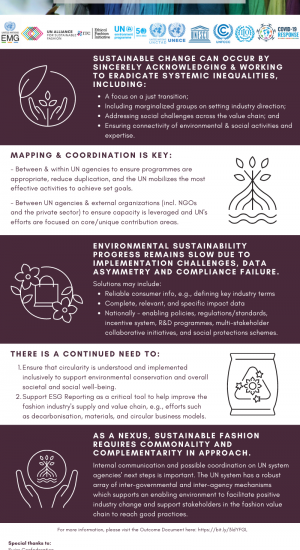
Sustainable Fashion is referenced by Stockholm+50, and the UNEP report ‘Sustainability and Circularity in the Textile Value Chain – Global Stocktaking’ as having the potential to support a Sustainable Recovery For All by applying the precautionary principle to the sustainable management of the environmental dimensions of its value-chain, including conscientious product design, natural resource and material inputs, workers’ health and wellbeing, treatment of waste, and end-of-life product disposal, in pursuit of circularity and enhancing resilience for intergenerational equity. Moreover, an integrated approach to environmental and social sustainability turns the drive towards circularity into a significant avenue for a just transition, with more and better jobs, social inclusion and poverty reduction.
Against this background, the UN Environment Management Group, in close collaboration with the UN Alliance for Sustainable Fashion, UN Conference on Trade and Development, UN Environment Programme, UN Economic Commission for Europe, UN Educational, Scientific and Cultural Organization, UN Framework Convention on Climate Change, and International Labour Organization, will organize a Sustainable Recovery through Sustainable Fashion: A Focus on the Environmental Dimensions (7 September 2021) Nexus Dialogue intending to facilitate an exchange of different approaches to address the environmental facets of the Sustainable Fashion Nexus, especially in pursuit of sustainable recovery from the COVID-19 context, and with an emphasis on the UN system’s programmes.
Partners will share knowledge of updated initiatives, challenges, and capacity gaps – the discussion will apply both a micro- and macro-lens.
The Micro-lens will have a peer-to-peer exchange on applying the environmental perspective to Sustainable Fashion, and identifying unexplored opportunities with a particular focus on circularity and decarbonization. The discussion will focus on how to adjust value chains towards environmental sustainability, including lifecycle implications on sustainable materials/inputs, product design, value chain traceability and transparency, sustainable consumption and production, and end-of-life management while applying the decent work agenda.
Quick links:
The Macro-lens will seek to mobilize the UN system in its support to the Fashion Industry in advancing a Sustainable and Resilient Recovery for All through the environmental lens under the auspices, of Stockholm+50 2022, and the Task Group of the One Planet Network and International Resource Panel.

Meeting Documents
Background Documents
- UNCTAD Creative Economy Outlook: Trends in international trade in creative industries
- UN Sustainable Fashion Alliance
- UN Sustainable Fashion Alliance: Synthesis Report on UN system wide Initiatives Related to Fashion
UN Alliance for Sustainable Fashion: Synthesis Mapping Report
UNEP Sustainability and Circularity in the Textile Value Chain – Global Stocktaking, 2020
- UNEP Sustainability and Circularity in the Textile Value Chain – Roadmap for action, 2021
- UNEP Circularity platform
- UNEP InTex (Innovative Business Practices and Economic Models in the Textile Value Chain
- ILO The future of work in textiles, clothing, leather and footwear, 2019
- ILO COVID-19 and the textiles, clothing, leather and footwear industries, 2020
- ILO Turning up the heat: Exploring potential links between climate change and gender-based violence and harassment in the garment sector, 2021
- UNECE Call to Action – The Sustainability Pledge, 2021
- UNECE Information exchange standard (business and data model) for sustainable and circular value chains in the garment and footwear sector, 2021
- UNECE Policy Brief-Harnessing the potential of blockchain technology for sustainability and due diligence in cotton value chains, 2021
UNECE Link to the Sustainability Pledge to submit your action
ITC ITC’s related online transparency/traceability tools – Social and Labor Convergence Program (SLCP) Gateway – (audit sharing platform)
IWTO: First full LCA for a wool garment available here: https://iwto.org/sustainability/life-cycle-assessment/
Other:
Projects & Initiatives
- Geneva Environment Network:
- UNCTAD Creative Economy programme, including stats
- UNCTAD creative economy network
- UNCTAD international year of creative economy events
- UNEP expert community on sustainability and circularity in the textile value chain
- UNEP Intex Project (Innovative Business Practices and Economic Models in the Textile Value Chain)
- UNECE Project (Enhancing traceability and transparency of sustainable and circular value chains in the garment and footwear sector)
- ILO/IFC Better Work Programme
- ILO Decent Work in the Garment Sector Supply Chains in Asia
- Fashion Makes Change
Presentations
- ILO Initiatives in the fashion Industry – ILO
- Accounting for The Environment – ITC-EFI
- Threading Change Youth Opening Intervention – UN Alliance for Sustainable Fashion
- The UNECE Framework Initiative: Enhancing Traceability and Transparency of Sustainable Value Chains in the Garment and Footwear Industry – UNECE
- Forests for fashion –fashion for forests – UNECE
- Sustainability and circularity in the textile value chain – UNEP
- UNFCCC Fashion Industry Charter for Climate Action – UNFCCC

